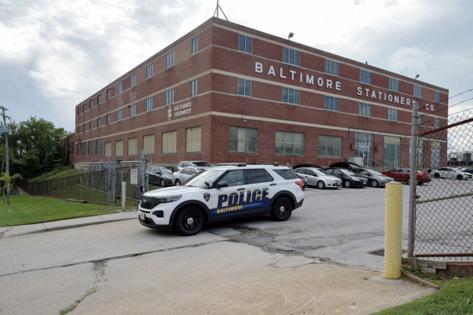Baltimore Police spend millions leasing buildings each year. What for?
Published in News & Features
BALTIMORE — Baltimore is spending millions per year on leases for the police department, including a dozen apartment rentals, a building owned by Royal Farms’ parent company and a former margarine plant.
Some of the leased properties have been used by Baltimore Police for years, but the department is paying far more than it used to. The annual rent at the former Baltimore Stationery Co. building, which houses the department’s Public Integrity Division, has doubled in the past decade, according to city spending records. (The building in Coldstream Homestead Montebello is owned by Two Farms, the parent company of the nearby Cloverland Dairy and the Royal Farms convenience chain.)
Having an array of long-term leases for expanding city services, rather than buying up new property, can give the city more flexibility, said Karl Maschino, a former U.S. Government Accountability Office official who now serves as a public policy professor at Carnegie Mellon University in Pittsburgh.
But renting also puts the city at risk of serving the interests of landlords over taxpayers through rent hikes and difficult lease terms, said Anirban Basu, an economist and frequent critic of Baltimore’s fiscal policy.
State auditors raised similar concerns in a July audit report that criticized Maryland’s Department of General Services process for relocating agencies from the midtown State Center complex, noting the state did not have support that the $410.9 million in new leases were in the State’s best interest.
Basu, who backed an effort to slash city property taxes, said the city “often embraces the ad-hoc when it’s planning its finances,” and short-sightedness can lead to “very poor outcomes.”
Newly this year, the city has spent over $21,000 on a dozen apartment rentals for crime victims and witnesses — though those expenses are paid through grant funds, not taxpayer dollars. Those short-term leases are funded through payments by offenders convicted of federal crimes.
Also this year the city made its first payment on a $9.3 million, 12-year lease at the former Unilever margarine facility on Southwestern Boulevard, which will house the police department’s SWAT unit.
The new location was formerly home to the J.H. Filbert margarine company, which produced the “Mrs. Filbert’s” line of butter substitutes and later, “I Can’t Believe it’s Not Butter!” Unilever bought Filbert in 1986.
Renovations to that building are ongoing, and officers have not yet moved in, police spokesperson Lindsey Eldridge said. The department’s SWAT team has 35 sworn members, she said.
The new spending on leases also comes as the city and a developer work to turn the former offices of The Baltimore Sun into a “multi-agency communications center” for Baltimore’s public safety agencies. The city’s combined rent and operating expenses for the building and parking garage on North Calvert Street total over $3 million per year, and the city has an $8.8 million agreement with the building’s owner, Atapco Properties, for design and budgeting on the project.
In such an arrangement, “there is no guarantee that the landlord has the taxpayer’s best interest in mind,” Basu said.
“If I’m a landlord, what am I trying to do? Whether it’s a building on Calvert Street, or wherever it happens to be, my goal is profit maximization and stability of cash flow” — potentially at the expense of the taxpayer, he said.
The city-leased portion of the Calvert Street building is currently being used by Baltimore’s police and fire departments, emergency management and IT section for various programs — including the police department’s Central District, the emergency operations center and CitiWatch, the city’s surveillance camera network, according to a spokesperson for the mayor’s office.
“Making that choice, to expand space, is a really big deal anyway,” regardless of whether that space is rented or bought, Maschino said. Whether it’s successful or not depends on getting the right amount of space — and, in the case of leasing, having the right terms, he said.
“If you’re wasting space by not filling it, that’s a waste of money,” he said. “If you’ve purchased not enough space, and then you have to do another base procurement, that’s an extra cost, too, for the government.”
©2025 Baltimore Sun. Visit baltimoresun.com. Distributed by Tribune Content Agency, LLC.







Comments